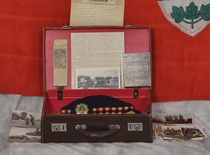
It’s one of the most compelling wartime stories I’ve ever encountered. And I almost missed it. There I was, up to my eyeballs in other stuff, when I got a call from two acquaintances. Jeremy Van Dyke organizes overseas travel tours and Frank Moore, a retired former banker, collects classic cars.
“Ted, we’ve got to meet,” Van Dyke said on the phone from Cambridge.
“I’m really busy,” I said.
“We’ve got a story you’ve got to tell,” Van Dyke insisted.
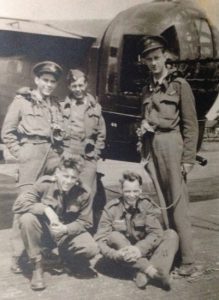
A few days later Van Dyke and Moore came to my office in Toronto. They set a small brown suitcase on the table in front of me. Moore gingerly opened it and showed me its contents. It was full of letters that had all been sent to a woman named Catherine McCracken, who’d lived in Montreal during the Second World War. Her son, Alex McCracken, 21, had enlisted in the RCAF, become a navigator aboard a Halifax bomber, and was shot down with six other crewmen on July 25, 1943.
The first of the letters to Mrs. McCracken had come from the commanding officer of the Pathfinder squadron in which her son served.
“It is the sincere wish,” C.O. Johnny Fauquier wrote her, “that your son will be found safe.” That letter was followed by another a few days later (in the suitcase as well) from the RCAF casualties officer at National Defence. In it he provided Catherine McCracken with the names of the next of kin of all her son’s crewmates: the parents of Cliff Kettley, 23, (wireless radio operator) in British Columbia; the parents of Mickey Tomczak, 23, (pilot) in Saskatoon; the parents of Ed White, 21, (air gunner) and Alex Sochowski, 22, (bomb-aimer) both from Saskatchewan.
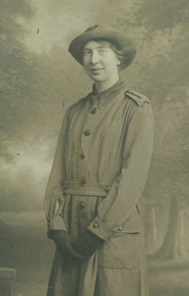
Suddenly confronted with the names of all the other families, as much left in the dark about their sons’ fate as Catherine McCracken was, she began to correspond with the other mothers of the missing airmen. The first evidence of that contact arrived in the mail at the McCrackens’ Montreal home in November 1943. Rosalie Kettley, parents of Cliff, wrote a thank-you note to Catherine’s letter of condolence. The Kettleys had received German confirmation that “our son lost his life July 25 and is buried in Ten Boer (Holland) cemetery along with Ed White. This, you will understand, is a great blow to our hopes.” Rosalie promised to stay in touch. Finally, she quoted her lost son.
“The last our boy mentioned was his plane,” Rosalie wrote Catherine. “It was ‘LQ-M for Mother,’ as Mother took good care of us when we were young and we hope our aircraft will continue to do so.”
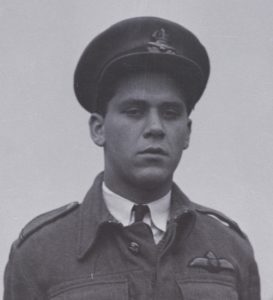
The only survivor of the air battle that night of July 25, 1943, it turned out, was Alex Sochowski, who bailed out safely. German soldiers arrived and took him away to the officers’ prison camp, Stalag Luft III, in Silesia. Allowed to write only a few cards and letters home a month, Sochowski wrote to the mother of his pilot Mickey Tomczak, a letter that was related to Catherine McCracken.
“I hope and pray that by the time this letter reached you, you will have had some word of Mickey,” Sochowki wrote. “I was taken POW by German soldiers … and to this day haven’t seen nor heard of any of the crew.”
Indeed, as the mothers of the downed airmen of bomber LQ-M for Mother would soon learn, Sochowski was the only crewman to survive. The remaining six had died in a fiery crash that night. But the ultimate loss of their sons didn’t end the correspondence among the mothers. They continued to write of the home-front tribulations of the war. Annie wrote Catherine about her other son Lloyd wounded in Belgium and operated on back in Canada.
“They took some bone from his hip and built up his forehead,” she wrote the McCrackens. “His sight is not any better, but there is a hope it may come back a little in time.”
When the war ended, freed POW Alex Sochowski on his way home made a cross-Canada pilgrimage of tribute to his fallen comrades, visiting each of the families’ homes. After his visit to Annie Tomczak in Saskatoon, she wrote a final letter to Catherine McCracken about their encounter.
“What a change. He is not the same boy he was three years ago,” she wrote. “He feels it very much being the only one left, and I don’t think he is very well.
After my meeting with Jeremy Van Dyke and Frank Moore sparking my curiosity to write up the story (it appears in the current edition of Airforce Magazine), the two men travelled to Ten Boer, Holland, where the town paid tribute to the lost airmen. Because of our interest in their mothers’ letters (saved in Catherine’s suitcase), the Dutch also acknowledged the mothers of bomber LQ-M for Mother.
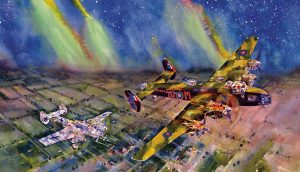
Thank you so much for this Ted.
There are so many great stories for and from the heart of WWII.
My mother is the sister of Mickey’s mother and my father survived WWII as a pilot and navigator – whereas many of his comrades – unfortunately – are at the bottom of the North Atlantic.
Pardon me for sharing this story with you. You are to blame for this! (haha) You stored up my memory!
If it wasn’t for the bombing of Pearl Harbour, I might not be here. (even lived there in the 70’s)
Dad was going with Mom at the time, after having ridden the rails back to Canada (to join the Air Force) from Oklahoma – where he was living in a barn apartment, working and going to school there because of the dirty thirties here where my grandparents had homesteaded before SK was a province.
He had no money and the border guards wouldn’t let him in his own country to enlist.
His brother had to drive from Saskatoon to the Border to hand him $10 in front of the guards. They then let him enter his homeland country to enlist and risk his life for his country and the rest of us who are thankful for freedom.
We – as you know – were in the war 2 yrs before the USA. So being in the RCAF for a couple of years, when Pearl Harbour was bombed Dec7/41- he said,”looks like I’ll be shipping out real soon, Eileen, so are we going to get married or what?”
She replied, “Yes!” and they were married the next day, Dec. 8/41. Sure enough – he shipped out within a month.
But – in that month – little Johnny (me) was conceived.
So I wondered who that guy was that moved in with Mom and I, 3 yrs later.
Found out soon enough though, cause I had 5 brothers and sisters in 10 1/2 yrs!
So many, many personal touching stories from those days.
When I think of the history and legacy of that one person with 6 kids, who survived, can’t help but meditate on the “would-be stories” that would exist if others had survived also.
Thank you so much for the memories.
Keep up your great work, Ted!!